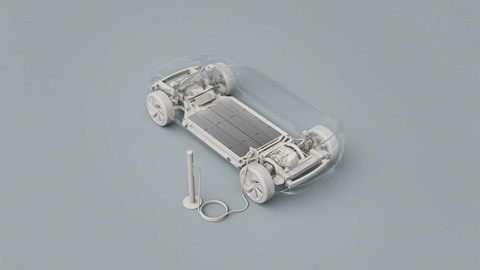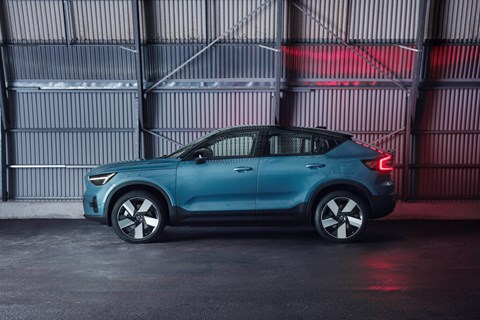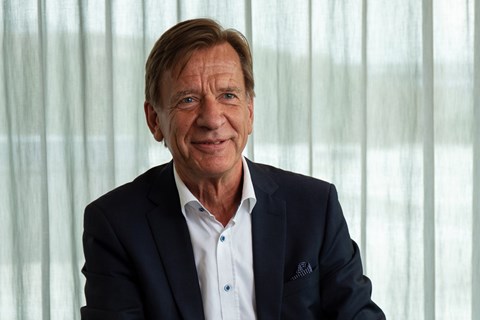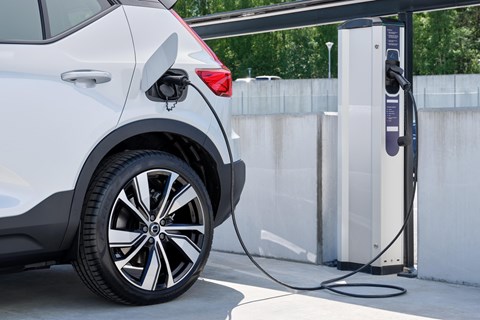► Brand goes all-electric by 2030
► Small electric Volvo SUV below XC40
► New Slovakian factory due 2026
Volvo has committed to being a fully-electric car brand by 2030 and is steadily expanding its range of pure battery electric vehicles (BEVs). The company is benefiting from a major investment by Chinese parent company Geely, which means it is building up quite an array of electric Volvos:
- EX90 Range-topping successor to XC90 goes all-electric
- XC40 Recharge Fully electric version of mid-sized crossover
- C40 Recharge Standalone coupe/hatchback, pure battery power
- EX30 We scoop the new, smaller crossover coming later in 2023
Except more electric models to follow – and plenty of the additional models will be crossover-flavoured. ‘We need to expand even more [with SUVs], we are planning something smaller even than the 40 Series. I would guess that we need less variants of sedans and wagons,’ former CEO Hakan Samuelsson told CAR in an interview after its 2030 announcement. ‘We’ll still have them but probably not as many, with more SUV models instead.’
The best electric SUVs

But, while the brand aims to capitalise on the SUV boom, the leadership still has one eye on what else is coming: ‘We will see more streamlined cars. We need to work with lower air resistance – there is not a need for a big grille – everything to improve the range for a car. But there is always a pendulum move – now everyone moves into big SUVs, but I think maybe the preference for smaller families and single persons will also mean that there is a future for something else than SUVs.’
Volvo: fully electric by 2030
Volvo’s top brass believe battery-electric vehicles can embody the company’s core values better than ever. The brand’s plans involve phasing out its remaining combustion engines, hybrids and plug-in hybrids. The aim is to make 50 per cent of its sales by 2025 fully electric, with the aim to make that 100 per cent by 2030. That commitment extends to cranking out at least one new pure electric car a year.

While the C40 (above) reintroduces the ‘C’ nomenclature to Volvo’s model range, Samuelsson assured us that the rest of the product range is expected to continue with the S (saloon), V (estate) and XC (SUV) names, even if they end up ‘morphing’ into fully-electric models in their next generation.
Volvo’s boss on electrification
The former chief executive, Håkan Samuelsson, who had been driving the new XC40 EV for a month before anyone else could get near one, told CAR in 2020: ‘If you can charge, I think an absolute majority of our customers will really appreciate the benefits of electric cars.
‘I’m one of them. I can charge here at work, I can charge in my garage at home, and when I do a long trip at the weekend, I now learn where to fast charge and it’s really no problem, takes me 30 minutes. For me an electric car is the perfect solution. I will never go back to anything else.’

Samuelsson has no doubts that Volvo has backed the right horse: ‘I feel quite confident, and definitely more confident than I would feel if we had taken another strategy – for example neglecting electric cars and staying with petrols or hybrids.’
He added: ‘In the last year we came to the conclusion that no, this is not just another powertrain choice for our premium cars – this is the start of a new all-electric premium segment. This is our first car in the world’s premium segment. The premium segment will be all-electric. We have ambitions of course to be a really big player in the electric premium segment, and there’s still a job to do for us in the next 10 years.’
R&D chief Henrik Green shares the CEO’s vision: ‘Our pure electric vehicles will be a better experience than non-pure electric vehicles. We are not trying to stand out as the most lightweight, super-energised, racetrack kind of vehicle. We come from personal safety, sustainability – it’s going to be very comfortable and pleasurable but not race-orientated to drive.
‘The role that the car plays in society is much more interesting and challenging and inspiring work than doing 300kph on the Nürburgring – which is a different challenge, and I respect that fully for those people who work with that. But for me and what we do it’s much more interesting to see how can we make the planet sustainable, how can we keep people safe. I mean, millions die in vehicles. How can we be part of reducing that or eliminating that? We are for people who use their cars in the daily commute. How do you get back and forth to work in a pleasurable experience? Your Spotify list works how it’s meant to work, it plays what you want to hear. It navigates to where you need to charge your car. That’s much more the challenge that we focus on.’

The switch of focus within Volvo had been stark and swift. ‘As an organisation and as a team we have really transformed ourselves, aiming now fully into pure electric. We have had a very good process of re-training people from combustion engine development and adjacent development of vehicles based on combustion engine technology into working with pure electric vehicles. It’s not a journey for all, but I’m very happy and pleased with the fact that so many have chosen to take that journey with us.’
Some aspects of his job have changed more than others: ‘If you go into pure electric propulsion systems and you talk about range, you talk about charging speed etc, it’s very traditional automotive attributes. It’s physics, it’s mechanics, it’s electricity, power, efficiency, so it’s very easy to get the same engineers to start chasing new boundaries.
‘It’s been a more difficult transition if we, for instance, talk about Android. We brought Android into the vehicle instead of making our own navigation system and our own speech, and dealing with a partner, that creates psychology-wise an even bigger transformation for us as a team.’ But worth it? ‘I love it.’
Where are electric Volvos being built?
Volvo has announced a new electric car factory in Kosice, Slovakia to build a slew of new EVs. It’s a major investment worth €1.2 billion (£1bn) and is projected to have a capacity of 250,000 vehicles a year when it opens in 2026.
The Slovakian factory is Volvo’s first new plant in Europe for 60 years – and a major part in the company’s strategy to become 100% electric by 2030. ‘Expansion in Europe, our largest sales region, is crucial to our shift to electrification and continued growth,’ Volvo CEO Jim Rowan said.
Volvo is busy updating all its factories to handle battery-powered cars. The famous Torslanda site is also being upgraded to handle new ‘mega casting’ processes, which essentially allow larger, single pieces of aluminum to be cast. Weight saving, cost and improved car performance are just a few of the benefits for Volvo’s future EVs.
A new battery assembly plant, where battery cells and modules are fused with the floor structure of the car is also planned for Sweden. Once again, the goal is to accommodate the next generation of electric cars.
Javier Varela, head of engineering and operations at Volvo, said: ‘Our future as a company is all-electric and that requires a variety of upgrades across the plant to ensure that Torslanda can continue to build premium electric cars of the highest quality.’
All our Volvo reviews